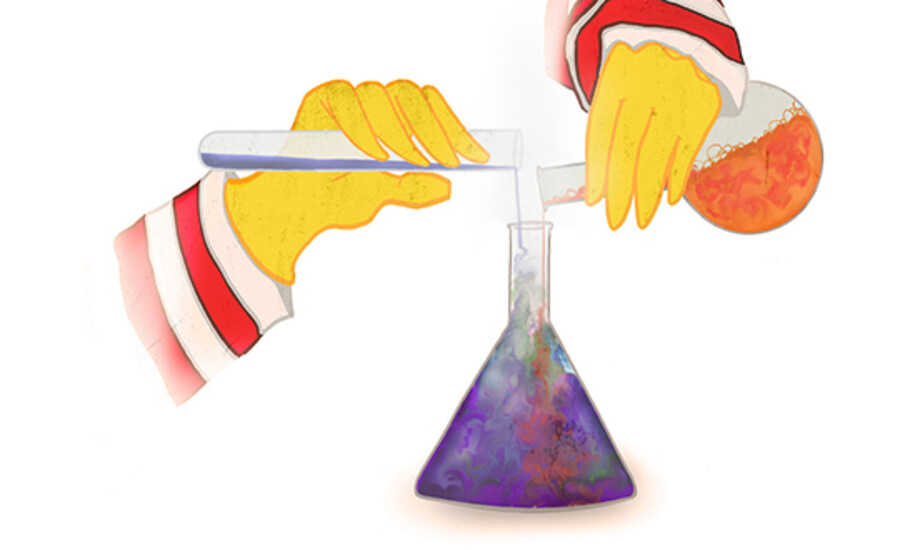
EMMA MOORE/TROMPET
How Companies Create Junk Food Addicts
Processed food is now embedded in modern society. We eat processed pre-packaged foods for breakfast, processed fast food for lunch, processed restaurant food for dinner, and processed snacks in between.
For food processing manufacturers and their grocery and restaurant clients, this is a profitable business model.
But why do you buy junk food? Some say manufacturers simply give us what we want, but the truth is more sinister. Over 15,000 new processed food products are introduced in the United States every year. And they don’t come from the scenic farms and grandmother’s kitchens pictured on the packaging. They come from labs, where they are assembled through advanced chemical manipulation, and from mass production facilities, where costs (not nutritional value) are monitored to the fraction of a fraction of a cent.
The key is demand. Food manufacturers need you to demand their products. Since global transport, long shelf lives and low costs inherently reduce nutritional value, these companies must rely on your apathy toward nutrition, your attraction to colorful packaging and advertising, and most of all, your partiality for taste.
Cheetos are made of corn, fat, salt and something called “cheese seasoning” (a formula of canola oil, “yellow 6” artificial coloring, and nine other ingredients, including “natural and artificial flavors,” which contain still further components). According to Salt Sugar Fat, industry insiders regard Cheetos as “one of the most marvelously constructed foods on the planet, in terms of pure [salivary] pleasure.”
Such foods are the product of millions of dollars of investment into crunch-softness balance, salivary response, olfactory release, vanishing caloric density, and salt-sugar-fat craving wonders of chemical engineering. Well-paid chemical engineers are at work right now optimizing the crunchiness of potato chips and the perfect fizz of soda pops and other components needed to generate cravings.
The profits rely on one gambit. Corporate behemoth Frito-Lay even puts it on the packaging: “Bet You Can’t Eat Just One.”
Another way to say it might be, “Bet you care about the present more than your future.” Either way, that bet is paying off for Frito-Lay: Its thousands of production plants, warehouses and offices in dozens of countries sell about $16 billion in chips, pretzels and other unhealthy snacks every year.
If we all put our bodies’ needs for nourishment ahead of our senses of taste, Frito-Lay’s revenue would be $0.
Manufacturers understand that food addiction is a real phenomenon. The additives they inject share the same biological basis as dependence on recreational drugs. Thus, eating junk food releases chemicals in the brain, including the neurotransmitter dopamine, and the brain’s response is far more powerful than those released while eating natural, nutritious foods. This can affect patterns of behavior and thought, and generate symptoms of tolerance and withdrawal, which are signs of physical addiction.
Producing a product that can reduce costs and increase cravings and profits means producing an unhealthy product. The “living” elements of food are often what make those foods nutritious, and these elements spoil soon after the fruit, vegetable, grain, dairy or meat is harvested. To slow the spoiling process, food laboratories must introduce chemicals and other additives that literally are not foods. If they didn’t, they would not have a product to sell. People would have to get their foods from gardens, farms, orchards and fresh grocers, rather than gas stations.
Food technology is profitable for corporations, but devastating to your health. Sucrose, high-fructose corn syrup, salt and fat are assets to food manufacturing, but detriments to those who eat them. Processed-food executives, stakeholders and even employees understand that their products are nutritionally dangerous.
The actions of these “food” companies, and our willingness to prioritize taste and put off consequences, have caught up with us. In 1990, no American state had an adult obesity rate above 15 percent. Today, all states are over 20 percent obese, and 31 states are over 30 percent obese.
God designed us to need food—but it is a need with almost limitless possibilities in nutrition and enjoyment. We cannot afford to prioritize convenience, cost and especially taste above nutrition. Our best option is to emulate what educator Herbert W. Armstrong said: “Eat only those natural foods that will spoil, and eat them before they do.” This type of diet includes more fresh vegetables and fruits, fresh meats, cooked whole grains and healthy fats. When you need to eat food from a box or a can, live by the rule of six or fewer recognizable, pronounceable ingredients.
Quitting processed food is a battle. There is simply too much investment and too much profit at stake for food companies: They will continue to entice you at every turn. But choose to fight this battle. It is far better than battling ill health and even terminal disease. Start by changing just one habit for one month. Then build from there. Build discipline. Build strength of mind and discover the God-intended enjoyment of real food and good health.
